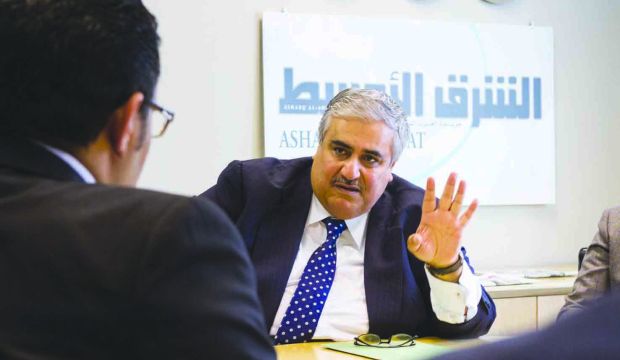
Bahrain’s Foreign Minister Sheikh Khalid Bin Ahmed Al Khalifa speaking at the headquarters of Asharq Al-Awsat in London on Wednesday October 14, 2015. (Asharq Al-Awsat/James Hanna)
“Had it not been for the intervention of Saudi Arabia under the leadership of the Custodian of the Two Holy Mosques King Salman Bin Abdulaziz at a critical moment in history, the shape of the region would have changed for the worse for decades to come,” Bahrain’s Foreign Minister Sheikh Khalid Bin Ahmed Al Khalifa said in an exclusive interview with Asharq Al-Awsat.
“If Operation Decisive Storm had not come on time, the situation would have been more dangerous and [the insurgents] would have wrested full control of Yemen which means a non-stop civil war,” Sheikh Khalid said, using the codename of the military campaign that Saudi Arabia and nine other Arab states launched in late March in a bid to reinstate the internationally recognized President Abd Rabbuh Mansur Hadi.
Yemen descended into chaos when an alliance of northern Shi’ites, known as Houthis, and supporters of ex-president Ali Abdullah Saleh took over large parts of Yemen, including the capital, Sana’a, in September of 2014, prompting Hadi to flee to the southern city of Aden and then to Saudi Arabia.
All Gulf Cooperation Council (GCC) states, except Oman, are part of the military campaign that Saudi Arabia has begun at the request of Hadi.
Sheikh Khalid, however, denied the GCC was divided over Operation Decisive Storm or the developments in Yemen, saying: “There is a divergence of views over how to deal with the issue between one side who did not want to participate, such as the Sultanate of Oman, and others who participated to the degree that they deployed troops in Yemen.”
The ultimate goal of Gulf troops entering Yemen, the FM said, is to stabilize the country and help the legitimate government of President Hadi to take the initiative, something which requires the implementation of UN Security Council resolution 2216 which calls for the immediate withdrawal of Houthis from the areas they have seized in Yemen.
All GCC member states agree on the need for implementing resolution 2216, Sheikh Khalid said, “As for how to deal with the situation [in Yemen], there is a divergence [of views] but not division.”
Commenting about the Iran nuclear deal, the Bahraini FM said finding a solution for Iran’s nuclear program has been the priority for the Gulf’s Western allies despite their knowledge of the Islamic Republic’s destabilizing role in the region.
Sheikh Khalid called Iran’s nuclear program “backward” but said it could pose further risks to the region if developed.
“But the other risks [of Iran] are in its spread of terrorism and terrorists in the region,” Sheikh Khalid said, adding that thousands of Iranian soldiers are fighting with Bashar Al-Assad’s forces in Syria.
